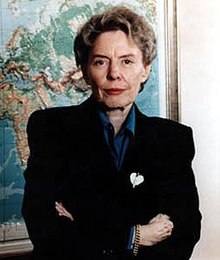Jeane Kirkpatrick | |
|---|---|
 Official portrait, 1981 | |
| 16th United States Ambassador to the United Nations | |
| In office February 4, 1981 – April 1, 1985 | |
| President | Ronald Reagan |
| Preceded by | Donald McHenry |
| Succeeded by | Vernon Walters |
| Personal details | |
| Born | Jeane Duane Jordan November 19, 1926 Duncan, Oklahoma, U.S. |
| Died | December 7, 2006 (aged 80) Bethesda, Maryland, U.S. |
| Political party | Socialist (1945–1948) Democratic (1948–1985) Republican (1985–2006) |
| Spouse | Evron Kirkpatrick |
| Children | 3 |
| Education | Barnard College Columbia University (BA, MA, PhD) |
| This article is part of a series on |
| Conservatism in the United States |
|---|
 |
Jeane Duane Kirkpatrick (née Jordan; November 19, 1926 – December 7, 2006) was an American diplomat and political scientist who played a major role in the foreign policy of the Ronald Reagan administration. An ardent anticommunist, she was a longtime Democrat who became a neoconservative and switched to the Republican Party in 1985. After serving as Ronald Reagan's foreign policy adviser in his 1980 presidential campaign, she became the first woman to serve as United States Ambassador to the United Nations.[1]
She was known for the "Kirkpatrick Doctrine", which advocated supporting authoritarian regimes around the world if they went along with Washington's aims. She believed that they could be led into democracy by example. She wrote, "traditional authoritarian governments are less repressive than revolutionary autocracies."[2] She sympathized with the Argentine junta during the Falklands War, while Reagan took the other side in support of British prime minister Margaret Thatcher.
Kirkpatrick served in Reagan's cabinet on the National Security Council, Foreign Intelligence Advisory Board, Defense Policy Review Board, and chaired the Secretary of Defense Commission on Fail Safe and Risk reduction of the Nuclear Command and Control System.[3] She wrote a syndicated newspaper column after leaving government service in 1985, specializing in analysis of United Nations activities.
- ^ "Jeane Kirkpatrick". The Economist. December 19, 2006. Archived from the original on November 20, 2007. Retrieved August 16, 2007.
- ^ "Middle Israel: The new world order". The Jerusalem Post. December 14, 2006. Retrieved August 16, 2007.[permanent dead link]
- ^ "Jeane Kirkpatrick, Former United States Ambassador to The United Nations, Joins IDT Corporation Board of Directors". IDT Europe. September 27, 2004. Archived from the original on September 27, 2007. Retrieved August 16, 2007.